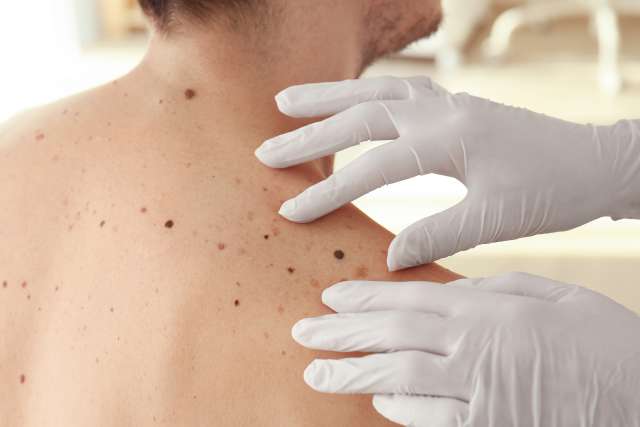Skin Cancer
UCLA Health’s skin cancer specialists offer research-based clinical treatments, innovative surgeries and preventive screenings.

Why choose UCLA Health for skin cancer care?
The skin cancer team at UCLA Health provides personalized, effective care in a supportive environment. Dermatologists, medical oncologists, radiation oncologists, surgical oncologists and nuclear medicine specialists work together to treat all types of skin cancer. As a high-volume program, we have robust experience in skin cancer care.
Additional highlights of our program include:
Individualized treatment: As your partner in skin cancer care, we provide the information you need to weigh your treatment options. Together, we create a personalized care plan that’s right for you. Our team stays up to date on the latest treatment recommendations so you receive the most effective therapies.
Access to innovative research: Our physicians research the best treatment approaches and help establish standards of care. We are part of the Southwest Oncology Group (SWOG), an organization that expands our access to innovative clinical trials. Our researchers co-developed Keytruda® in the largest-ever phase 1 cancer study. This first-of-its-kind immunotherapy for skin cancer successfully treats advanced melanoma.
Nationally recognized specialists: UCLA Health attracts some of the nation’s most renowned and highly trained specialists. They use their extensive expertise to treat all types of skin cancers, including the rarest types.
Expertise that drives outcomes: In skin cancer treatment, the order in which you receive surgery and other anti-cancer therapies matters. Our physicians have the skills and expertise to recommend the approach with the best chance of a positive outcome. We also use comprehensive genetic profiling to learn more about the genetic changes (DNA mutations) within a tumor. This advanced technique can help us determine what medications will most effectively treat the cancer.
Superior care close to home: UCLA Health offers skin cancer care in multiple locations across greater Los Angeles. This means you receive high-quality care that’s convenient for you.
Our services
We strive to identify skin cancer in its early stages, when it’s most treatable. From diagnosis to post-cancer support, UCLA Health offers a wide range of services, including:
Diagnosis
Our experts detect skin cancer during a physical exam of your skin. If they suspect a mole or lesion is cancerous, they perform a skin biopsy. This test involves removing abnormal tissue and sending it to the lab to be analyzed. Types of skin biopsy include:
- Shave biopsy: Using a sharp, razor-like tool, the doctor removes a thin layer of skin.
- Punch biopsy: The doctor uses a round, hollow instrument to remove a small yet deeper sample of skin tissue.
- Excisional biopsy: Using a tiny knife, the doctor removes the entire skin lesion, along with a portion of healthy skin.
Cancer support
If you have skin cancer, a supportive community can help you navigate your care. The Simms/Mann-UCLA Center for Integrative Oncology provides resources to ease the burden of cancer on you and your loved ones. You’ll find trainings and workshops on helpful topics, from mind-body healing and spiritual care to stress-management strategies and more.
Cancer research
We study new, effective ways to treat skin cancer, so you always receive the most up-to-date treatment. Eligible patients may have access to promising therapies through clinical trials.
Our Melanoma Clinic in Dermatology focuses on melanoma prevention and treatment. This specialty clinic works with UCLA Health’s medical and surgical oncology teams to conduct advanced research for better treatments.
Types of skin cancers we treat
Skin cancer develops from an overgrowth of cancerous cells. The three main types of skin cancer include:
Basal cell carcinoma: The most common form of skin cancer, basal cell carcinoma is highly treatable and rarely spreads. Starting in basal cells in the top layer of skin, this slow-growing cancer is generally a result of exposure to the sun’s UV light.
Squamous cell carcinoma: The second-most common type of skin cancer, squamous cell carcinoma results from excessive sun exposure and is common among light-skinned people. It is highly treatable but can spread to other parts of the body if not treated.
Melanoma: The least common but deadliest type of skin cancer, melanoma begins in the skin’s pigment-producing cells. This type of skin cancer can begin as an abnormal mole, become cancerous and spread quickly.
Skin cancer treatments we offer
UCLA Health experts offer nonsurgical and surgical skin cancer treatments. Our doctors recommend treatment based on the type and size of skin cancer, and if it has spread.
Nonsurgical skin cancer treatments
Doctors can treat many skin cancers without surgery. These nonsurgical treatments include:
- Chemotherapy: Your doctor may recommend a lotion or cream with cancer-killing medicine that is applied to the skin. More advanced skin cancers may require chemotherapy drugs that you take by mouth (orally) or intravenously (through a vein).
- Immunotherapy: This medication boosts the patient’s own immune system to destroy cancer cells.
- Photodynamic therapy: This treatment uses light to activate specialized topical or intravenous drugs that destroy cancer cells.
- Radiation therapy: This treatment uses high-energy beams to kill cancerous tissues that your doctor cannot remove with surgery.
- Targeted therapies: These include drugs that target specific gene mutations (changes) that help a tumor grow. By targeting specific changes, these therapies can destroy cancer cells or slow their growth.
Skin cancer surgery
Depending on the type and stage of skin cancer, surgery may be your best option. Our surgical oncologists specialize in:
- Cryosurgery: This procedure kills precancerous and cancerous skin cells by freezing them with liquid nitrogen.
- Curettage and electrosurgery: This combination of techniques removes basal cell and squamous cell carcinomas. The surgeon scrapes the tumor with a sharp tool and uses an electric current to burn, cut or clot the cancerous tissues.
- Excision: This surgical procedure removes skin cancer cells or growths.
- Laser surgery: Doctors use this minimally invasive treatment to kill cancer cells with a narrow beam of high-intensity light.
- Mohs micrographic surgery: A highly effective technique, Mohs surgery removes squamous cell and basal cell carcinomas layer by layer, until only healthy tissue remains.
Meet our team
Our nationally renowned specialists offer the most current skin cancer treatment options. Physicians across the country refer their patients to our team for advanced skin cancer care.
Contact us
Call 888-662-8252 to request an appointment with a skin cancer specialist at UCLA Health.
Find your care
Our experts provide lifesaving treatments and procedures that minimize scarring. To learn more, call 888-662-8252.

